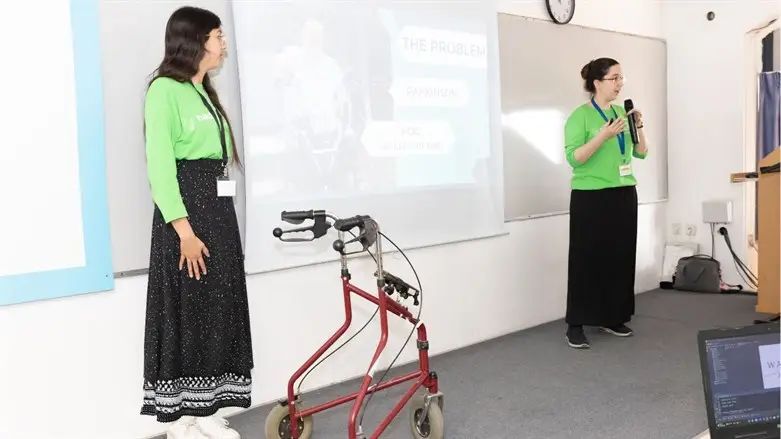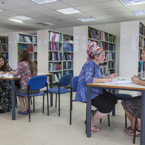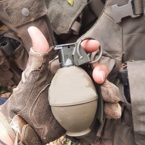This website uses cookies to ensure you get the best experience on our website. privacy policy and terms of use.
August 2023
August 2023
Oriya Demlich spent the past few years watching her beloved grandfather suffer from Parkinson's Disease and witnessed it slowly erode his independence. After his death, Demlich enrolled in the Tal Campus for Women at the Jerusalem College of Technology to earn a Bioinformatics degree.
Last month, her late grandfather served as a source of inspiration when she participated in the school's hackathon where she and her teammates decided to come up with a mechanism with life-saving implications for those with the disease.
The team participated in JCT's sixth annual "Hack.Her.It" event organized by the school's Schreiber LevTech Entrepreneurship Center. Some 150 students from the women's campuses participated in the event where they were tasked with coming up with solutions to complex technological challenges posed to them by hi-tech companies including Rafael, Intel, Elbit, Amazon, and more.
"The Schreiber LevTech Entrepreneurship Center offers a range of programs for students to gain valuable experience in the real world of entrepreneurship, innovation, and product creation on campus. "Students work under the guidance of professional business and tech mentors in hackathons, workshops, and pre-accelerator and accelerator programs", explains Orlee Guttman, co-founder of the center. "These tools and experience are crucial to their futures as entrepreneurs or intrapreneurs".
The center dovetails with the school's overall mission to provide a rigorous curriculum focusing on engineering, health sciences, and business degrees to some 5,000 students from Israel and 38 countries around the world. The school offers a dual curriculum, combining Jewish studies and academia, and consists of students from the Orthodox and ultra-Orthodox sectors.
As for Demlich, her team, which was composed of other bioinformatics and engineering students, worked on the "WalkSafe Challenge" (named after the company of the same name) and developed an emergency sensor for walkers used by Parkinson's patients. Their solution garnered so much positive attention from the judges that they made it to the final stage of the competition.
More than 10 million people suffer from Parkinson's worldwide, with 35,000 of them living in Israel. The disease arises from a neurological dopamine deficiency which causes many motor problems such as uncontrollable tremors, stiff joints, a condition called "Freezing of Gait" where the knee is immobile which severely inhibits one's ability to walk properly.
Freezing of Gait is particularly dangerous for those with Parkinson's who need the assistance of a walker to move because the upper body continues to propel forward while the other half is stationary leading to the possibility of falling that could cause a life-threatening head injury.
"A person with Parkinson's doesn't have the same reaction time as the average person if they fall, so they need a companion who can monitor them when muscle locking occurs in order to prevent a fall," Demlich explained.
As such, the team developed an innovative sensor that is based on artificial intelligence that notifies the patient to put the brake on their walkers without external assistance. The device is operated by an app that is accessible on smartphones and uses data to monitor the motion of the walker.
"The app measures the distance between the walker and the person, based on data that is cross-referenced from both sources," a representative from the WalkSafe explained. The sensor is designed to detect when a person is still pushing the walker even though their feet have remained frozen in place. In which case, the person can fall if the walker is not stopped. As a result, the sensor beeps and alerts the patient that he must use the handbrake and thus prevent falling.
"Our app helps Parkinson's patients not only physically through notifying them of potential dangers, but the device helps psychologically as well, as it gives them a renewed sense of independence," Demlich said.
The students will continue to fine-tune their idea and are aiming to create a walker with a device built in to enable the walker to brake automatically if it senses the patient is too far away from it. They are also exploring the possibility of collaborating with other companies who would be able to install the sensor they developed on other similar products like a baby stroller.


Prof Foxbrumer was recognized by president for contribution to Swords of Iron...

JCT Teams Up with MMY to offer academic programming to women studying in the...

Dr Yossi Golobchiev from JCT's Electronics department discusses the recent...